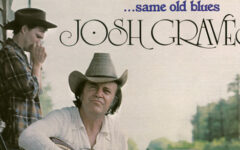 Music Of Coal – Various Artists (Lonesome Records & Publishing CD 071); two CDs with 70 page book, released in 2007
Music Of Coal – Various Artists (Lonesome Records & Publishing CD 071); two CDs with 70 page book, released in 2007
The work of coal miners has long been commemorated in song, disasters have led to contemporaneous ballad type songs and personal acquaintance with victims of the industry has led to intense, heart-rending insights into the side-effects of working below ground. Many songs have been found during song-catcher expeditions – some of those recording are found here, others have been written by those with a social conscience as a form of protest at times of strife. As well as embracing the social ramifications, political, historic and economic aspects of life in coal mining communities.
The industry ‘captured’ labour at a very young age and the picture of a disheveled youngster on the cover is a evidence of that. It’s a refection of the level of poverty for the often big families that boys had to go to work in the mines to help boost their father’s income. There has seemingly been very little scope for avoiding the pits. Not many people have been able to follow Ron Short’s advice in Set Yourself Free.
The collection is sub-titled Mining Songs From The Appalachian Coalfields and, in fact, the music chosen is pared down to music from southern Appalachia and to that by local talent. There is a mixture of styles – big band, jazz, old-time (in its various sub-sets, including string band), traditional country, bluegrass, folk, blues, boogie-woogie and choral.
Also, the performances are by people from a variety of classes; miners, labour organisers, activists, religious leaders and professional musicians. The quality of these vary, just as the sound quality of the recordings themselves vary, but some tracks do feature well known pickers; Mike Seeger, Jimmy Gaudreau, Jim Watson, Wayne Benson, Robert Bowlin, Glen Duncan, Mike Bubb, Jamie Johnson and Jimmy Mattingly included.
The recordings themselves span a century, beginning with the opening song on the first disc – Down In A Coal Mine an excerpt from The Edison Concert Band and made in 1908. Other recordings from the early part of the last century include Mining Camp Blues by Trixie Smith (1925); He’s Only A Miner Killed In The Ground -Ted Chestnut (1928); Coal Miner’s Blues – The Carter Family (1938) and Sprinkle Coal Dust On My Grave – Orville Jenks (1940), sung to the same melody as Sunny Side Of The Mountain.
A few songs are performed a cappella style. Among those are by Hard Times In Coleman’s Mine by Aunt Molly Jackson (recorded in 1937); Coal Black Mining Blues by Nimrod Workman (1972); That 25 Cents You Paid by Sarah Ogan Gunning; Fountain Filled With Blood by Elder James Caudill and Choir (2007); West Virginia Mine Disaster – Molly Slemp.
Several are sung with just one instrument, usually a guitar. Examples of these are the afore-mentioned song by Orville Jenks; The L & N Don’t Stop Here Anymore by Jean Ritchie; Black Waters by Jim Ringer and chorus; Roof Boltin’ Daddy – Gene Carpenter; Coal Town Saturday Night by Randall Hylton.
An exception is Dorothy Myles’s soulful, rather religious rendition of What Are We Gonna Do?, with sedate piano accompaniment.
Many songs get the bluegrass treatment. Among those are Dream Of A Miner’s Child by Carter Stanley, with his daughter, Jeannie, and brother Ralph and the Clinch Mountain Boys; Union Man from Blue Highway; Blue Diamond Mines – Robin and Linda Williams; Miner’s Prayer written by Kentuckian Dwight Yoakam and sung by him, with assistance from Ralph Stanley; Nick Stump – Deep Mine Blues; Tom T Hall – I’m A Coal Mining Man; Kenneth Davis, a former member of the Clinch Mountain Boys, with a performance of the Earl Sykes/Ralph Stanley song Dirty Black Coal; Don Stanley & Middle Creek – A Strip Miner’s Life and Ralph Stanley II – Daddy’s Dinner Bucket.
In Those Mines features claw hammer banjo, by the song writer Becky Buller, as her band leader Valerie Smith sings this contemporary song. Russell Moore provides harmony vocals.
Among the contemporary acoustic style songs [or bluegrass sans banjo] are Thirty Inch Coal by Hobo Jack Adkins; Explosion At Derby Mine – Charles Maggard; Coal Dust Kisses – Suzanne Mumpower-Johnson; Coal Tattoo – Dale Jett; You’ll Never Leave Harlan Alive by the composer Darrell Scott. This sounds as though it was recorded in front of an audience.
The last track of this set is by Natalie Marchant, who offers a folky version of the anthemic Whose Side Are You On?
In the country mould is the Merle Travis classic Dark As A Dungeon, performed with just his own guitar for accompaniment; another Travis song, Sixteen Tons by Ned Beatty and There Will Be No Black Lung (Up In Heaven) performed by Rev Joe Freeman. It is in part a recitation, very reminiscent of Roy Acuff.
The song titled Black Lung used in this collection is not the well known Hazel Dickens’ song by that name, but one inspired by the meagre monthly compensation cheque that his maternal grandmother received, written and performed by A J Roach. Ms. Dickens’ vast repertoire of coal mining songs is represented by The Yablonski Murder, a tale about the politics in the industry.
As concept albums go, this collection takes its place among the finest. Presented in a book format measuring approximately 10 inches by 6 inches, it contains two CDs with a total of 48 tracks. The book itself has an Introduction, written by producer Jack Wright, a Sanctus contributed by Archie Green, the doyen of coal mining music scholarship with his book Only A Miner, and to whom the anthology is dedicated, and Foreword by Jon Lohman of the Virginia Folklife Program. Additionally, it comprises a brief essay giving some background to the song and/or the singer, innumerable black and white photographs, most courtesy of Helen Lewis and lyrics.
Also, the book remembers that mining wasn’t an exclusively male preserve with a few brief references to the experiences of female mine workers. Of course, women were significant in holding their, often large, families together, supporting their men folk domestically as well as often championing their causes in their invariably shared tumultuous lives.
Music Of Coal is a very valuable documentation from the perspective of the workers in a treacherous industry that is nevertheless so necessary as it provides a fundamental need in all our lives. It does well to remind us of the many sacrifices that have blighted lives and the landscape in earlier times of Appalachian coal mining.







